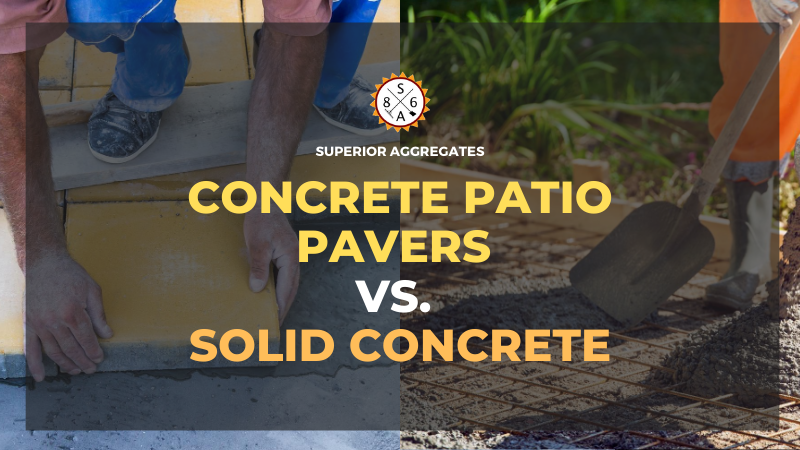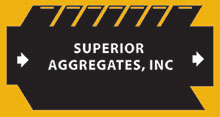
Concrete Patio Pavers vs. Solid Concrete
If you are looking for a way to improve the appearance of your home or office’s exterior, then you are probably thinking about using pavers or concrete. With so many options from which to choose, you want to make sure that you go with the right one to meet your needs. That is why it is important to compare pavers and concrete, looking at the pros and cons of each.
Pavers vs. Concrete: Appearance
First, it is important to take a look at the appearance. Most people consider pavers to be more visually appealing than concrete. This is because there is more flexibility in the appearance of pavers. You can tailor the designs and colors to meet their needs. While concrete also comes in a range of shades, the diversity is not as significant. While you can go with stamped or decorative concrete, the color tends to fade quickly. Therefore, most people like the appearance of pavers just a little bit more.
Pavers vs. Concrete: Installation
On the other hand, pavers are also more difficult to install than concrete. A concrete slab is almost always poured. This means that the installation process tends to move a bit more quickly. On the other hand, pavers need to be laid by hand one at a time. Therefore, it is advisable to have a professional to install both pavers and concrete. While it is possible to handle pavers as a DIY project, it is always better to hire professionals to make sure the appearance is as beautiful as possible. If the pavers have to be removed and laid a second time, this will add to the cost.
Pavers vs. Concrete: Costs
With both pavers and concrete, the cost is going to depend on the surface area that has to be covered, the materials, whether previous pavers and concrete have to be removed, and the cost of labor. In general, the cost to cover a 120 square foot area with pavers is going to fall somewhere between $1,300 and $1,700. On the other hand, the cost to cover the same area with concrete is going to fall somewhere between $800 and $1,100. The exact price is going to vary, which is why it is always a good idea to get a quote ahead of time.
Pavers vs. Concrete: Maintenance
In general, concrete is easier to maintain than pavers; however, pavers are more durable. Concrete tends to crack and stain over time. Eventually, the concrete slab will have to be replaced. Concrete needs to be brushed and rinsed off from time to time. So the maintenance is pretty easy. When pavers are placed, the pieces are usually covered with a polymer that helps to interlock the pavers and keep them durable. This allows them to last longer.
Find the Right Option for Your Landscaping Needs
This is a brief overview of the differences between pavers and concrete patio options. While concrete is cheaper and easier to install, it doesn’t last as long. Furthermore, pavers provide more customizability for projects. If you are looking for a way to improve the appearance of your outdoor landscape, think about reaching out to a local concrete company to talk about concrete and paver options for your property! The possibilities are nearly endless with the right concrete company!
If you are looking for a way to improve the appearance of your home or office’s exterior, then you are probably thinking about using pavers or concrete. With so many options from which to choose, you want to make sure that you go with the right one to meet your needs. That is why it is important to compare pavers and concrete, looking at the pros and cons of each.
Pavers vs. Concrete: Appearance
First, it is important to take a look at the appearance. Most people consider pavers to be more visually appealing than concrete. This is because there is more flexibility in the appearance of pavers. You can tailor the designs and colors to meet their needs. While concrete also comes in a range of shades, the diversity is not as significant. While you can go with stamped or decorative concrete, the color tends to fade quickly. Therefore, most people like the appearance of pavers just a little bit more.
Pavers vs. Concrete: Installation
On the other hand, pavers are also more difficult to install than concrete. A concrete slab is almost always poured. This means that the installation process tends to move a bit more quickly. On the other hand, pavers need to be laid by hand one at a time. Therefore, it is advisable to have a professional to install both pavers and concrete. While it is possible to handle pavers as a DIY project, it is always better to hire professionals to make sure the appearance is as beautiful as possible. If the pavers have to be removed and laid a second time, this will add to the cost.
Pavers vs. Concrete: Costs
With both pavers and concrete, the cost is going to depend on the surface area that has to be covered, the materials, whether previous pavers and concrete have to be removed, and the cost of labor. In general, the cost to cover a 120 square foot area with pavers is going to fall somewhere between $1,300 and $1,700. On the other hand, the cost to cover the same area with concrete is going to fall somewhere between $800 and $1,100. The exact price is going to vary, which is why it is always a good idea to get a quote ahead of time.
Pavers vs. Concrete: Maintenance
In general, concrete is easier to maintain than pavers; however, pavers are more durable. Concrete tends to crack and stain over time. Eventually, the concrete slab will have to be replaced. Concrete needs to be brushed and rinsed off from time to time. So the maintenance is pretty easy. When pavers are placed, the pieces are usually covered with a polymer that helps to interlock the pavers and keep them durable. This allows them to last longer.
Find the Right Option for Your Landscaping Needs
This is a brief overview of the differences between pavers and concrete patio options. While concrete is cheaper and easier to install, it doesn’t last as long. Furthermore, pavers provide more customizability for projects. If you are looking for a way to improve the appearance of your outdoor landscape, think about reaching out to a local concrete company to talk about concrete and paver options for your property! The possibilities are nearly endless with the right concrete company!

